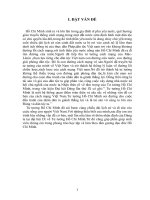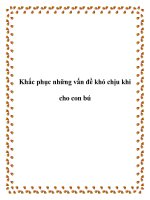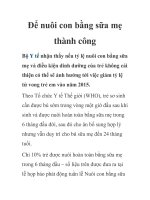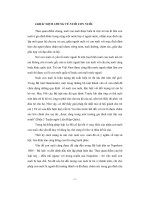Những vấn đề nuôi con bằng cách bú vú mẹ
Bạn đang xem bản rút gọn của tài liệu. Xem và tải ngay bản đầy đủ của tài liệu tại đây (362.04 KB, 10 trang )
Breastfeeding Problems
Breastfeeding problems are common, but they last a short time. These
tips may help. If you find that the problems persist, call your doctor,
nurse or lactation specialist.
Engorgement
Engorgement is when the breasts become full, firm, tender and
sometimes painful as your breast starts to produce milk. This often
occurs 3 to 5 days after delivery.
Signs of engorgement often last 24 to 48 hours. Signs include:
• Larger, heavier and tender breasts
• Breasts that are hard, painful and warm to the touch
• Swelling of the breasts
• Firm nipples and areola
Ways to Prevent Engorgement
• Feed your baby at least 8 to 12 times each day.
• Wear a support bra 24 hours a day while your breasts are heavy. Use
a sport or comfort style bra without under wires. Some mothers find
more comfort without a bra.
1
Vấn Đề cho Con Bú Vú
Những vấn đề nuôi con bằng cách bú vú mẹ là bình thường, nhưng chỉ
kéo dài một thời gian ngắn. Nên theo một vài hướng dẫn. Nếu quý vị
thấy vẫn còn vấn đề, xin gọi bác sĩ, y tá hoặc chuyên viên cho bú.
Vú bị căng sữa
Vú bị căng sữa là khi vú trở nên đầy sữa, cứng, đau và thỉnh thoảng đau
nhức do vú bắt đầu sản xuất ra sữa. Triệu chứng này thường xảy ra từ 3
đến 5 ngày sau khi sanh.
Dấu hiệu vú căng đầy sữa thường kéo dài từ 24 đến 48 giờ. Dấu hiệu bao
gồm:
• Vú lớn hơn, nặng hơn và dễ đau
• Vú bị cứng, đau nhức và ấm khi sờ vào
• Sưng vú
• Núm vú cứng và có quầng
Cách tránh vú bị căng sữa
• Cho trẻ bú sữa ít nhất từ 8 đến 12 lần mỗi ngày.
• Mang thêm đai nịt ngực suốt 24 giờ trong ngày khi vú của quý vị trở
nên nặng nề. Dùng nịt ngực thể thao hoặc nịt ngực kiểu thoải mái
không có dây bên dưới. Một số bà mẹ thấy thoải mái hơn khi không
dùng nịt ngực.
Breastfeeding Problems. Vietnamese.
1
• If your breasts become engorged:
ff
ff
ff
ff
ff
Place a clean, hot, damp cloth over each breast for 3 to 5 minutes
before nursing or get into a warm shower and let very warm water
flow over your shoulders. Heating the breasts will help your milk
flow easily to your baby. After heating the breasts, massage them
in a circular motion towards the areola and the nipple. Massaging
will move the milk down. Massage under the arms and the
collarbone area if this area is firm and uncomfortable.
Soften the breast using hand expression or a breast pump. Express
enough breast milk to soften the areola so that baby can easily
attach.
Breastfeed right away. Gently massage your breasts while nursing.
If the breasts are still painful, full and swollen after a
breastfeeding, or refill within a half hour after feeding, you may
pump to soften the breasts.
Apply cold packs to the breasts for 20 minutes after nursing.
Nipple Soreness
Nipple soreness often occurs when the baby is not attached well to the
breast or positioned correctly. Make sure your baby’s jaws are deeply
over your areola and about ½ inch behind the base of your nipple. Your
nipple should be rounded and erect after the baby detaches.
Ways to Prevent Nipple Soreness
• If you feel pinching, rubbing or biting pain during the feeding, check
the baby’s position and attachment.
• Air-dry your nipples by leaving your bra flaps down for a couple of
minutes after a feeding.
2
• Nếu vú bị căng sữa:
ff
ff
ff
ff
ff
Đặt khăn sạch, nóng, ẩm ướt lên trên cả hai vú khoảng 3 đến 5
phút trước khi cho bú hoặc dùng vòi nước ấm và để nước rất ấm
chảy tràn hai vai của quý vị. Làm nóng hai vú sẽ giúp cho sữa
chảy dễ dàng vào miệng của trẻ. Sau khi làm nóng, xoa bóp hai vú
theo hình tròn hướng về vùng có quầng và núm vú. Sự xoa bóp sẽ
làm sữa chuyển xuống. Xoa bóp bên dưới cánh tay và vùng xương
đòn nếu vùng này cứng và khó chịu.
Làm cho vú mềm bằng cách dùng bàn tay ấn hoặc bơm hút sữa.
Bóp đều vú sữa để làm mềm vùng thâm quầng cho trẻ dễ dàng
bám dính.
Cho bú sữa ngay lập tức. Xoa bóp nhẹ nhàng hai vú của quý vị
trong khi cho bú.
Nếu vú vẫn còn đau nhức, đầy sữa và sưng sau khi cho bú, hoặc
lại đầy sữa trong nửa giờ sau khi cho bú, quý vị có thể hút sữa để
làm mềm vú.
Đắp khăn ướp lạnh lên vú khoảng 20 phút sau khi cho bú.
Đau nhức núm vú
Núm vú bị đau nhức thường xuyên khi trẻ không bám chặt vào vú hoặc
bú không đúng tư thế. Đặt đúng hàm của trẻ vào sâu bên trên vùng thâm
quầng và khoảng 12.7 mm (1/2 inch) đằng sau đáy núm vú của quý vị.
Núm vú của quý vị phải tròn và cương lên sau khi trẻ buông miệng ra.
Cách ngăn ngừa đau nhức núm vú
• Nếu quý vị thấy đau như bị ngắt véo, cọ sát hoặc cắn núm vú trong
khi cho bú, nên kiểm tra vị trí và cách bám chắc của trẻ.
• Để khô núm vú của quý vị bằng cách bỏ nịt ngực xuống vài phút sau
khi cho bú.
Breastfeeding Problems. Vietnamese.
2
• Express a small amount of colostrum or milk and spread it around the
nipple and areola after air-drying.
• Avoid the use of soap, alcohol and extra water on the breast. Clean
your breasts by allowing water to flow over them when showering.
If You Have Nipple Soreness:
• Feed your baby more often for shorter periods of time.
• Do not allow your baby to become too hungry.
• Do not use an artificial nipple shield over the breast for feeding. They
can cause damage to your nipple and interfere with milk flow.
• Use a purified lanolin product or gel pad to heal cracked or open
areas.
• Begin feeding on the least sore nipple. Be sure to break suction
carefully by sliding your finger inside your baby’s mouth.
• If it remains painful when your baby first latches on, remove your
baby and try again.
• A fast, deep latch will put your baby’s jaws behind the nipple and
tender areas.
Plugged Duct
A plugged duct is a tender or painful lump in the breast. If left untreated,
it may lead to an infection. Plugs often occur from changes in the baby’s
feeding pattern or pressure on the breast. Check your breast for pressure
points that occur from a bra that is too tight or from bunched clothing on
the breast.
3
• Vắt một ít sữa non hoặc sữa mẹ và trét xung quanh núm vú và vết
quầng sau khi để khô.
• Tránh dùng xà bông, rượu và nước dư trên vú. Làm sạch vú của quý
vị bằng cách để nuớc chảy trên vú trong khi tắm.
Nếu quý vị đau nhức núm vú:
• Cho trẻ bú nhiều lần với thời gian bú ngắn hơn.
• Không để trẻ quá đói.
• Không dùng núm vú nhân tạo để che vú khi cho bú. Núm vú nhân tạo
có thể làm đau núm vú của quý vị và cản trở sữa chảy.
• Dùng sản phẩm tinh chế từ lanolin hoặc kem dính để làm lành vết nứt
hoặc vùng hở.
• Bắt đầu cho bú bên núm vú ít đau nhất. Nhớ ngưng cho trẻ nút sữa
cẩn thận bằng cách đẩy nhẹ ngón tay của quý vị vào trong miệng của
trẻ.
• Nếu núm vú vẫn còn đau nhức khi trẻ bám lần đầu, bỏ trẻ ra và thử
lại.
• Bám chắc nhanh và sâu sẽ đặt hàm của trẻ sau núm vú và vùng bị
đau.
Ống bít
Ống bít (plugged duct) là một u căn đau trên vú. Nếu không điều trị, thì
vấn đề này có thể dẫn đến nhiễm khuẩn. Vấn đề bít nghẽn thường xảy ra
từ thay đổi kiểu cho trẻ bú hoặc sức ép lên vú. Kiểm tra các điểm bị ép
trên vú do nịt ngực quá chặt hoặc áo vú bó sát.
Breastfeeding Problems. Vietnamese.
3
If You Have a Plugged Duct:
• Apply moist heat to the breast 15 to 20 minutes before each feeding.
• Massage the breast from the area behind the discomfort toward the
nipple.
• Change positions lining-up the baby’s chin and jaw toward the plug.
• Let the baby nurse first on the affected breast. The stronger suck will
help relieve the plug.
Breast Infection
A breast infection occurs from a blocked duct or from bacteria that has
entered the breast, often through a cracked nipple. Even though the
breast tissue is inflamed, the baby will not become ill from feeding on
the infected breast.
Signs of breast infection may include:
• A headache, aching joints, fever or chills
• A hard, red and painful breast
• A fussy or unwilling to nurse baby when using the infected breast
Call your doctor right away if you think you may have a
breast infection.
• Your doctor may order medicine to treat the infection. Take the
medicine for the full time ordered. Do not stop taking your medicine,
even if you feel better, without first talking to your doctor.
4
Nếu quý vị bị ống bít:
• Đắp khăn có hơi nóng ẩm ướt lên vú khoảng 15 đến 20 phút trước
mỗi lần cho bú.
• Xoa bóp vú phía sau vùng khó chịu hướng về núm vú.
• Thay đổi vị trí để cằm của trẻ và hàm hướng về lỗ bít.
• Cho trẻ bú đầu tiên trên vú bị đau. Trẻ nút sữa mạnh mẽ sẽ giúp giảm
đau ống bít.
Nhiễm trùng Vú
Nhiễm trùng vú xảy ra từ ống bị chận hoặc từ vi khuẩn xâm nhập vào vú,
thường từ núm vú bị nứt. Mặc dù mô vú bị viêm nhưng trẻ vẫn không
mắc bệnh khi bú sữa trên vú bị nhiễm.
Dấu hiệu nhiễm trùng vú bao gồm:
• Nhức đầu, nhức khớp, bị sốt hoặc ớn lạnh
• Vú cứng, đỏ và đau nhức
• Mẹ khó chịu hoặc miễn cưỡng cho bú sữa khi dùng vú nhiễm khuẩn
Gọi bác sĩ ngay lập tức nếu nghĩ rằng vú của quý vị có thể
bị nhiễm khuẩn.
• Bác sĩ sẽ kê đơn thuốc để chữa trị nhiễm khuẩn. Dùng thuốc hết thời
gian yêu cầu. Không ngưng thuốc, ngay cả khi quý vị cảm thấy khỏe
hơn, mà không cho bác sĩ biết trước.
Breastfeeding Problems. Vietnamese.
4
• Continue to breastfeed your baby often to drain the infected breast. If
your breast is too painful to breastfeed, you may need to use a breast
pump until you are able to breastfeed your baby again.
• Rest often and drink a lot of fluids.
Talk to your doctor or nurse if you have any questions or concerns.
2007 – 11/2011 Health Information Translations
Unless otherwise stated, user may print or download information from www.healthinfotranslations.org for personal, non-commercial use only. The medical information
found on this website should not be used in place of a consultation with your doctor or other health care provider. You should always seek the advice of your doctor or
other qualified health care provider before you start or stop any treatment or with any questions you may have about a medical condition. The Ohio State University
Medical Center, Mount Carmel Health System, OhioHealth and Nationwide Children’s Hospital are not responsible for injuries or damages you may incur as a result of
your stopping medical treatment or your failure to obtain medical treatment.
5
• Tiếp tục cho trẻ bú sữa mẹ thường xuyên để dẫn lưu vú nhiễm khuẩn.
Nếu vú cũng còn đau nhức khi cho bú thì quý vị cần dùng bơm hút
sữa cho đến khi quý vị có thể cho trẻ bú vú mẹ lại.
• Nghỉ ngơi thường xuyên và uống nhiều thức uống.
Cho bác sĩ hay y tá biết nếu quí vị có thắc mắc hoặc quan tâm nào.
2007 – 11/2011 Health Information Translations
Unless otherwise stated, user may print or download information from www.healthinfotranslations.org for personal, non-commercial use only. The medical information
found on this website should not be used in place of a consultation with your doctor or other health care provider. You should always seek the advice of your doctor or
other qualified health care provider before you start or stop any treatment or with any questions you may have about a medical condition. The Ohio State University
Medical Center, Mount Carmel Health System, OhioHealth and Nationwide Children’s Hospital are not responsible for injuries or damages you may incur as a result of
your stopping medical treatment or your failure to obtain medical treatment.
Breastfeeding Problems. Vietnamese.
5









